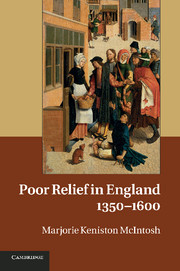Book contents
- Frontmatter
- Contents
- Acknowledgements
- Notes on conventions and online resources
- Abbreviations
- 1 Introduction
- Part I Late medieval and early Tudor patterns
- Part II Profound change during the early Reformation period
- Part III Intensified problems and altered approaches in the later sixteenth century
- Part IV Responding to the problems
- 9 The Poor Laws of 1598 and 1601
- 10 Conclusion
- Appendices included in the printed volume
9 - The Poor Laws of 1598 and 1601
Published online by Cambridge University Press: 05 January 2012
- Frontmatter
- Contents
- Acknowledgements
- Notes on conventions and online resources
- Abbreviations
- 1 Introduction
- Part I Late medieval and early Tudor patterns
- Part II Profound change during the early Reformation period
- Part III Intensified problems and altered approaches in the later sixteenth century
- Part IV Responding to the problems
- 9 The Poor Laws of 1598 and 1601
- 10 Conclusion
- Appendices included in the printed volume
Summary
The late Elizabethan Poor Laws contained a series of measures that addressed how assistance should be given to the kinds of poor people we have considered in previous chapters. Statutes of 1598 dealt with alms seekers and ex-soldiers, hospitals and almshouses, and parish relief, while also defining “charitable uses” or trusts and creating a new form of ready access to equity justice. That legislation grew out of a mixture of ideological and practical pressures. The teachings of the Church of England about Christian charity and the impact of humanist or commonwealth thinking played a part. But more pressing was the rise in poverty, due in a longer perspective to demographic growth that outstripped economic development, but in immediate terms to a series of disastrous harvests in the later 1580s and 1590s that depressed the economy and brought issues of population rise and unemployment to a head. The ad hoc solutions already tried (clerical calls from the pulpit for more generous almsgiving, days of fasting imposed each week, and importation of subsidized grain for the poor by some counties as well as urban bodies) were insufficient. Particularly worrying was the large number of able-bodied men who were willing to labor but could not find work. As the hunger and desperation of many poor people intensified, leading to occasional food riots and threatened uprisings, leaders at both national and local levels became willing to accept a more active role for the state in defining appropriate aid and addressing the obstacles that hampered current forms of relief.
When Parliament convened in October 1597, its debates ranged over multiple causes and symptoms of the current crisis, including agrarian problems and the rise in vagabondage as well as the plight of the needy. Seventeen bills dealing with such issues were introduced, some by private members, which were then pared down by a committee to the measures approved early in 1598. Several of the statutes (concerning soldiers, parish aid, and trusts) were modified slightly when the next Parliament sat in 1601. All of these measures counted on the willingness and ability of the Privy Council, Justices of the Peace (JPs), and parish officials to enforce their provisions.
- Type
- Chapter
- Information
- Poor Relief in England, 1350–1600 , pp. 273 - 293Publisher: Cambridge University PressPrint publication year: 2011
- 1
- Cited by



